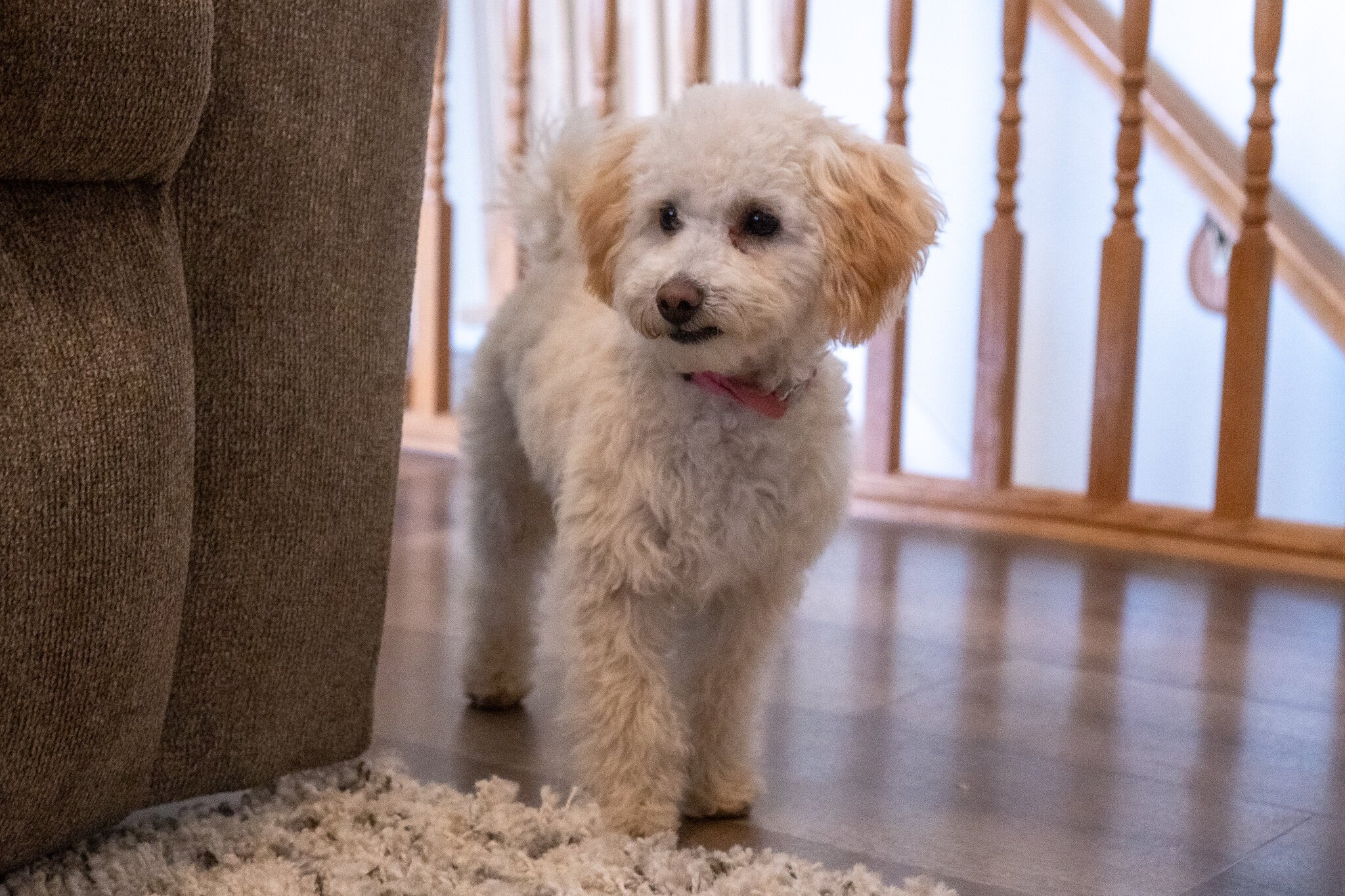Welcome to our comprehensive guide on feeding your Maltipoo puppy! Ensuring that your puppy gets the right nutrition is one of the most important responsibilities as a pet owner. It's not just about keeping their tummies full; it's about giving them the nutrients they need to grow, develop, and live a long, healthy life.
This guide is designed to help you navigate the world of Maltipoo nutrition, from understanding their unique dietary needs to establishing a feeding schedule that suits their growth. We'll also introduce you to some of our top recommendations for puppy food, treats, and nutritional supplements, each carefully chosen ensure they live to the average expected Maltipoo lifespan.
Whether you're a first-time Maltipoo owner or a seasoned puppy parent looking for some new insights, we hope this guide provides you with the information you need to make confident, informed decisions about your Maltipoo's diet. So, let's dive into the world of feeding Maltipoo puppies!
Maltipoo Nutritional Needs
Maltipoos, like all puppies, require a specific balance of nutrients to support their growth and development. A Maltipoo is a crossbreed between a Maltese and a Poodle, inheriting the traits of both breeds. This means their nutritional needs are slightly unique and should be catered to accordingly.
Protein: Protein is the building block of your puppy’s body, playing a crucial role in the development of muscles, tissues, and organs. High-quality animal proteins should be the primary ingredient in any food you choose for your Maltipoo puppy.
Fats: While it's important to control the amount of fat in your Maltipoo's diet, healthy fats are necessary for brain development, energy, and maintaining a healthy coat. Look for foods that contain omega-3 and omega-6 fatty acids.
Carbohydrates: Carbs provide your puppy with the energy they need to play and explore. But not all carbs are created equal. Whole grains, fruits, and vegetables are excellent sources of complex carbohydrates and fiber that help keep your puppy feeling full and their digestive system running smoothly.
Vitamins and Minerals: These are essential for a variety of bodily functions, such as bone growth and immune system support. They are typically provided through a balanced diet, but sometimes, supplements may be needed to ensure your puppy is getting everything they need.
Water: Proper hydration is crucial for puppies, as they need more water relative to their size compared to adult dogs. Always ensure fresh, clean water is readily available for your puppy.
Interestingly, these nutritional elements align with the composition of high-quality puppy food, treats, and supplements. Throughout this article, we’ll discuss food treats and supplements that offer a balanced blend of these nutrients from safe and wholesome sources.
How often should you feed your Maltipoo?
Establishing a regular feeding schedule is key to keeping your Maltipoo puppy happy and healthy. Here's a general guideline based on age:
8-12 weeks: At this age, puppies should be fed four times a day. Their small stomachs can't hold a lot of food, but they need plenty of nutrients for their rapid growth.
3-6 months: As they grow, you can reduce feedings to three times a day. This helps them adjust to a more adult feeding pattern.
6-12 months: From six months onward, feedings can be reduced to twice a day — usually morning and evening.
How long can a Maltipoo go without eating?
Maltipoos, like most dogs, should not go without food for more than a day (24 hours). However, extended periods without eating can lead to serious health problems. It's important to understand that while dogs can survive without food for about 3-5 days, this is not recommended, and it can cause significant harm. Regular feeding based on veterinary guidelines is crucial for their health and well-being. We strongly discourage withholding food from your dog, as it could lead to severe health issues.
How much should I feed My Maltipoo?
2-4 lbs: 1/3 to 1/2 cup per day
5-8 lbs: 1/2 to 3/4 cup per day
9-12 lbs: 3/4 to 1 cup per day
13-16 lbs: 1 to 1 1/4 cups per day
17-20 lbs: 1 1/4 to 1 1/2 cups per day
Remember, these are just guidelines and actual feeding amounts should be adjusted based on your puppy's activity level, age, and overall health. It's also important to remember that different foods have different caloric densities, so these measurements may not translate exactly between different brands or types of food. Always consult with your vet to get the most accurate feeding recommendations for your Maltipoo. They can provide advice tailored to your puppy's specific needs and help you monitor their growth and weight to ensure they're getting just the right amount of food.
What kind of food should a Maltipoo eat?
Recommended Food: Life's Abundance Small & Medium Breed Puppy Food
When it comes to choosing the best food for your Maltipoo puppy, we recommend Life's Abundance Small & Medium Breed Puppy Food. This premium puppy food has been specifically formulated to meet the nutritional needs of small and medium breeds, making it an excellent choice for your Maltipoo.
Here's why we love Life's Abundance for your Maltipoo:
Quality Ingredients: Life's Abundance features high-quality, wholesome ingredients. Protein, sourced from premium chicken and fish meals, is the first ingredient, ensuring your puppy gets the essential amino acids they need for muscle development. The inclusion of healthful grains provides the complex carbohydrates your puppy needs for energy.
Balanced Nutrition: This puppy food provides a perfect balance of protein, fats, and carbohydrates, aligning with the nutritional needs of a Maltipoo puppy. It also includes a blend of vitamins and minerals to support your puppy's overall health and development.
Omega-3 and Omega-6 Fatty Acids: Life's Abundance is enriched with omega-3 and omega-6 fatty acids. These are essential for brain development, immune function, and maintaining a healthy skin and coat.
Probiotics and Prebiotics: This puppy food includes a mix of probiotics and prebiotics to support your puppy's digestive health. This is especially helpful for puppies as they transition from their mother's milk to solid food.
No Artificial Preservatives or Colors: You won't find any artificial preservatives or colors in Life's Abundance food. They believe in providing natural, wholesome nutrition for your puppy.
What human foods can Maltipoos eat?
Maltipoos can safely enjoy a number of human foods in moderation, provided they're prepared without added spices, salts, or oils. Here's a brief list:
Peanut Butter: A great source of protein and healthy fats, but make sure it's free from xylitol, an artificial sweetener that is toxic to dogs.
Cooked Chicken: A lean source of protein that's easy on their digestive system.
Carrots: Can be served cooked or raw, they are a great source of vitamins and fiber.
Blueberries: Packed with antioxidants and fiber.
Pumpkin: Excellent for digestive health, but ensure it's plain and not the sweetened or spiced kind.
Green Beans: High in fiber and low in calories, they make a healthy treat.
Sweet Potatoes: Cooked sweet potatoes are rich in dietary fiber, vitamins, and minerals.
*Remember, these foods should complement your Maltipoo's balanced diet and not be their main source of nutrition. Always consult your vet before making significant changes to your dog's diet.
Tips for changing dog food
Transitioning your Maltipoo to Life's Abundance should be done gradually over a week to avoid upsetting your puppy's stomach. Start by mixing a small amount of Life's Abundance with their current food, gradually increasing the amount of new food while decreasing the amount of the old food each day.
Remember, it's important to consult your vet when introducing a new food to your puppy's diet. They can provide guidance and monitor your puppy's reaction to the new food. With Life's Abundance Small & Medium Breed Puppy Food, you can feel confident you're providing your Maltipoo with the nutrients they need to thrive.
The Importance of Treats and Training
Treats play a significant role in a puppy's life. They're not just delicious snacks; they're powerful tools for training and bonding. When used correctly, treats can help reinforce positive behavior, making them an essential part of a successful obedience training program.
At Our Obedience Training Program, we use treats to reward puppies for learning new commands and behaving well. The instant gratification they receive from a tasty treat reinforces the behavior we want them to repeat, making the learning process more enjoyable for them and more effective for us.
But treats aren't just for training. They're also a fun way to show your puppy some extra love and can be used to make regular activities, like grooming or vet visits, more enjoyable. Plus, they're a great way to keep your puppy occupied and mentally stimulated.
However, it's important to remember that treats should be given in moderation. As a general rule, treats should make up no more than 10% of your puppy's daily caloric intake to ensure they're still getting the majority of their nutrients from their main diet.
Choosing the right treats is equally important. You want something that's not only tasty but also healthy and suitable for your Maltipoo puppy. In the next section, we'll introduce you to our top recommendation for puppy treats and why they're a hit with the puppies in our Obedience Training Program.
Recommended Treats: Blue Buffalo Bits
When it comes to rewarding your Maltipoo puppy, we highly recommend Blue Buffalo Bits. These treats are a favorite among the puppies in our Obedience Training Program, and it's easy to see why.
Here are a few reasons why we love Blue Buffalo Bits for your Maltipoo:
Quality Ingredients: Blue Buffalo Bits are made with real meat, such as chicken or beef, as the first ingredient, providing your puppy with high-quality protein. They also contain wholesome ingredients like oats and flaxseed for additional nutritional benefits.
Nutrient-Rich: These treats are packed with omega-3 and omega-6 fatty acids to support your puppy's skin and coat health, as well as DHA to aid cognitive development.
No Artificial Additives: Just like with their main diet, you want to avoid artificial colors, flavors, or preservatives in your puppy's treats. Blue Buffalo Bits are free from these additives, so you can feel good about giving them to your puppy.
Perfect for Training: Blue Buffalo Bits are soft, making them easy for your puppy to eat, and their small size makes them ideal for training purposes.
For smaller puppies, including young Maltipoos, it might be worth breaking these treats in half or even quarters. This allows you to reward your puppy more frequently during training sessions, reinforcing positive behaviors without overdoing the treat intake.
Remember, even though these treats are nutritious, they should still be given in moderation. Too many treats can lead to weight gain and nutritional imbalances. As a general rule, treats should make up no more than 10% of your puppy's daily caloric intake.
Blue Buffalo Bits are a great way to reward your Maltipoo puppy while supporting their overall health. Whether you're training or just showing some extra love, these treats are a fantastic choice.
Supplementing Your Maltipoo's Diet: NuVet Labs
While a balanced diet is crucial for your Maltipoo puppy's health, there may be times when supplements can help fill in any nutritional gaps. This is where NuVet Labs comes in. They offer a range of high-quality, natural supplements designed to support your puppy's overall health.
Here's why we recommend considering NuVet Labs for your Maltipoo:
Wide Range of Products: NuVet Labs offers a variety of supplements, each designed to support different aspects of your puppy's health. Whether you're looking to boost your puppy's immune system, improve their coat's condition, or support joint health, NuVet Labs has a product that can help.
High-Quality Ingredients: NuVet Labs uses only the highest quality, natural ingredients in their supplements. This means you can feel confident that you're giving your puppy something that's not only beneficial but also safe.
Veterinarian-Approved: Many of NuVet Labs' products are recommended by veterinarians, adding an extra layer of trust and credibility.
Easy to Administer: NuVet Labs' supplements come in easy-to-administer forms, such as chewable tablets or powder that can be mixed into your puppy's food. This makes it simple to incorporate them into your Maltipoo's diet.
When considering supplements, it's important to consult with your vet. They can provide guidance based on your puppy's specific needs and help ensure that the supplements you choose align with their current diet and health status.
Supplements, like those from NuVet Labs, can be a valuable addition to your Maltipoo's diet, helping to support their health and well-being as they grow and develop.
Use Order Code: 591017
Foods to Avoid for Maltipoo Puppies
While it's essential to know what to feed your Maltipoo puppy, it's equally important to know which foods to avoid. Some foods that are perfectly safe for humans can be harmful or even toxic to dogs. Here are some foods you should never feed your Maltipoo puppy:
Chocolate: Chocolate contains theobromine, a substance that can cause heart problems, muscle tremors, or seizures in dogs.
Grapes and Raisins: These can cause kidney failure in dogs. Even a small amount can make a dog sick.
Onions and Garlic: These foods can cause gastrointestinal irritation and could lead to red blood cell damage in dogs.
Alcohol and Caffeine: These can cause a variety of symptoms in dogs, from intoxication and nervous system problems to rapid heart rate, seizures, and even death.
Xylitol: This artificial sweetener, found in many sugar-free products like gum and candy, can cause a rapid insulin release in dogs, leading to hypoglycemia (low blood sugar).
Avocado: Avocados contain persin, a substance that can cause vomiting and diarrhea in dogs.
Dairy Products: Some dogs are lactose intolerant and can experience digestive upset from consuming dairy products.
Raw Meat, Eggs, and Bones: Raw meat and eggs can contain bacteria like Salmonella or E. coli, which can be harmful to pets. Raw bones can be a choking hazard or cause damage to a dog's digestive tract.
High-Sodium Foods: Foods high in salt can cause excessive thirst and urination in dogs, and in extreme cases, can lead to sodium ion poisoning.
Remember, this is not an exhaustive list, and there are many other foods that can be harmful to dogs. If you're ever unsure whether a food is safe for your Maltipoo, it's best to consult with your vet before giving it to your puppy. Always keep these foods out of your puppy's reach and educate all family members about the dangers of these foods to ensure your Maltipoo's safety.
Conclusion
Feeding your Maltipoo puppy properly is one of the most critical aspects of puppy care. With the right diet and feeding schedule, along with appropriate treats and possible supplements, you can set your puppy up for a lifetime of good health.
Remember, the nutritional needs of your Maltipoo will change as they grow and develop. Regular check-ups with your vet are essential to ensure their diet continues to meet their changing needs.
We recommend quality products like Life's Abundance Small & Medium Breed Puppy Food, Blue Buffalo Bits for treats, and NuVet Labs for nutritional supplements, all of which are designed to support your puppy's health and well-being.
Lastly, always be mindful of foods that are harmful to dogs and keep them out of your puppy's reach.
By understanding and implementing these guidelines, you'll be well on your way to providing the best possible care for your Maltipoo puppy. Happy feeding!
Frequently Asked Questions
Q: What causes my dog to have bad breath?
A: Bad breath in dogs can be caused by poor dental hygiene, such as tartar buildup or gum disease, as well as underlying health issues, such as gastrointestinal problems or metabolic disorders. Read here for more
Q: How often should I feed my Maltipoo puppy?
A: For puppies aged 8-12 weeks, you should feed them four times a day. As they grow, this can be reduced to three times a day from 3-6 months, and twice a day from 6 months onwards.
Q: Can I give my Maltipoo puppy human food?
A: While some human foods are safe for dogs, many are not. Always consult with your vet before introducing any new foods into your puppy's diet. Avoid toxic foods such as chocolate, grapes, raisins, onions, garlic, alcohol, caffeine, xylitol, avocado, dairy products, raw meat, eggs, bones, and high-sodium foods.
Q: Why is my Maltipoo puppy not eating?
A: There could be several reasons, including illness, changes in environment, or picky eating habits. If your puppy refuses to eat for more than a day, consult with your vet.
Q: Can I overfeed my Maltipoo puppy?
A: Yes, overfeeding can lead to obesity and other health issues. It's essential to stick to a regular feeding schedule and avoid giving too many treats. If you're unsure about the right amount of food, consult with your vet.
Q: When should I switch my Maltipoo from puppy food to adult food?
A: Generally, you should start transitioning your Maltipoo to adult food when they reach maturity, which is usually around one year of age. However, it's best to consult with your vet for specific advice based on your puppy's individual needs.
Q: How much water should my Maltipoo puppy drink?
A: A good general guideline is that dogs should drink between 1/2 and 1 ounce of water per pound of body weight each day. Always ensure that your Maltipoo has access to fresh, clean water.
Remember, every puppy is unique, and these answers are intended as general guidelines. Always consult with your vet for advice specific to your Maltipoo puppy.









